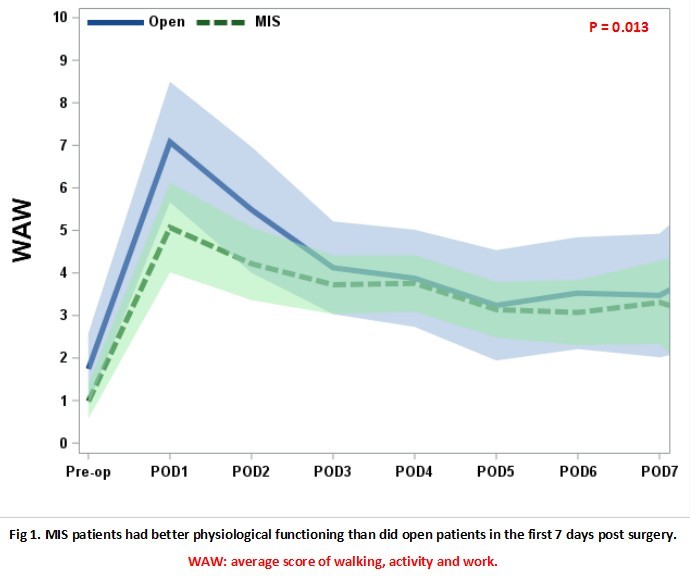Virtual Library
Start Your Search
Xiaojun Yang
Author of
-
+
P3.15 - Treatment in the Real World - Support, Survivorship, Systems Research (Not CME Accredited Session) (ID 981)
- Event: WCLC 2018
- Type: Poster Viewing in the Exhibit Hall
- Track:
- Presentations: 1
- Moderators:
- Coordinates: 9/26/2018, 12:00 - 13:30, Exhibit Hall
-
+
P3.15-08 - Patient-Reported Outcomes (PROs) in Patients with Lung Resection: Open Versus Minimal Invasive Surgery (ID 13291)
12:00 - 13:30 | Author(s): Xiaojun Yang
- Abstract
Background
As a novel and cutting-edge indicator to evaluate the quality of surgery, e.g. minimal invasive surgery (MIS), Patient-Reported Outcomes (PROs) has not been implemented in patients with lung resection in the real world. This study aims to profile PRO-measured symptom burden in patients with lung resection of either open surgery (OS) or MIS.
a9ded1e5ce5d75814730bb4caaf49419 Method
We conducted a prospective study on lung resection patients from November 22, 2017 to April 23, 2018. MD Anderson Symptom Inventory-lung cancer module (MDASI-LC) was used to assess the severity of perioperative symptoms and how they interfered with daily functioning. MDASI-LC was administered on the pre-operation day and daily after surgery up to the day of discharge. Trajectories of symptom severity and interference were compared between OS and MIS via mixed effects models.
4c3880bb027f159e801041b1021e88e8 Result
Among 78 lung resection patients, 22 received OS and 56 received MIS. Most of the resection types were lobectomies (74.4%). All patients completed pre-operation assessment and the missing rate after surgery was less than 10%. There were no statistically significant differences between OS and MIS in pre-operation variables including age, BMI, hemoglobin, neutrophil ratio, platelets and creatinine. Within the first week after surgery, the most severe symptoms were pain, cough, fatigue, disturbed sleep and dry mouth for OS patients and pain, fatigue, cough, disturbed sleep and shortness of breath for MIS patients. MIS patients reported better physiological functioning (walking, general activity and work) than did OS patients in the first 7 days post surgery (p=0.013). Among patients with MIS, those with stage II-IV reported more severe fatigue than did stage I patients over the hospitalization (p=0.018).

8eea62084ca7e541d918e823422bd82e Conclusion
This real world data preliminarily profile patients’ experiences over a short period after lung resection. Compared to OS, MIS did not show a significant advantage in symptom severity, but related to better functioning on daily living. Additional recruitments and follow-up will expand patients’ perceptions to the full trajectory of recovering from lung resection.
6f8b794f3246b0c1e1780bb4d4d5dc53


